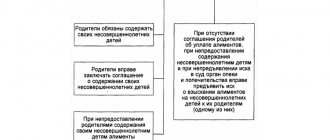Author of the article: Lina Smirnova Last modified: January 2020 11715
Whatever the situation, parents are obliged to provide financially for their children, in general, until they reach adulthood. Even if a parent is imprisoned, he is required to pay child support from prison. Let's consider what funds are used to make alimony payments when citizens are deprived of their liberty, what is their maximum amount and calculation procedure, as well as the conditions for the release of debt obligations for alimony.
Is it possible to collect alimony from the convicted father of a child?
While serving a sentence in a place of deprivation of liberty, each convicted person can perform some work, which is paid. Earnings in this case are small but stable. If a prisoner does not work or his income is not enough to pay off alimony, he will be left with a debt that will not disappear anywhere by the time of his release.
According to the Family Code of the Russian Federation, parents are obliged to support their minor children, and responsibility for the maintenance and upbringing of children falls on both parents equally.
Parents have the right to enter into an agreement on the maintenance of their minor children (agreement on the payment of alimony) in accordance with Chapter 16 of this Code. If parents do not provide maintenance to their minor children, funds for the maintenance of minor children (alimony) are collected from the parents in court.
Articles on the topic (click to view)
- Assignment of the right to claim under alimony obligations is possible
- Formula for calculating penalties and fines for alimony: sample
- What are the consequences of not paying child support in 2020?
- Criminal liability for non-payment of alimony under Art. 157 of the Criminal Code of the Russian Federation
- Is alimony from financial assistance withheld for vacation?
- Find out the debt by name from the bailiffs for alimony
- Reducing alimony debt over the past period
Article 80 of the Family Code of the Russian Federation
The law also stipulates that convicted persons serving a sentence are not exempt from liability:
- in educational colonies;
- in prisons;
- in correctional colonies;
- in colony settlements;
- in medical correctional institutions.
So, if the husband is convicted and is serving a prison sentence, he is not exempt from paying alimony. If a settlement agreement on payment has not been concluded, the mother (or guardian) files a claim in court on a general basis.
How much alimony can be paid?
Detention is not grounds for release from parental responsibilities
The amount of payments is established by the court or a settlement agreement and is collected on a general basis on a monthly basis:
- in proportion to earnings;
- in a fixed amount of money;
- at the same time: in shares and a fixed amount of money.
The calculation in shares is as follows:
- for 1 child - 1/4 of earnings;
- for 2 children - 1/3 of earnings;
- for 3 or more children - 1/2 earnings.
A fixed sum of money is established by the court, and it consists of the Nth number of minimum wages. The amount of minimum wage is determined taking into account the following factors:
- the child’s previous standard of living;
- financial and marital status of the parties;
- other circumstances requiring attention.
For example, the court took into account the child’s previous standard of living, as well as the fact that the plaintiff did not remarry. The court determined the amount of the monthly payment - 2 minimum wages.
The procedure for determining the amount of alimony for convicted citizens
The amount of alimony payments of the payer if he is in prison is determined on the basis of the calculation procedure established by law. It can be determined:
- as a percentage of the prisoner's earnings;
- in a fixed fixed monetary amount;
- in percentage and fixed amounts at the same time.
The percentage is calculated as follows:
| For one child | For two children | For three children or more |
| 25% | 33% | 50% |
A constant monetary amount of payments by court decision or voluntary agreement of the parties is established in the event that a citizen in prison has no income or has occasional earnings. It is focused on the minimum wage indicator and is set taking into account:
- the standard of living of the ward provided to him before the payer was in custody;
- financial situation of both parties;
- individual circumstances of the family of the alimony recipient. For example, the court may take into account the child’s previously secured standard of living and the fact that the second parent living with him, in particular the child’s mother, has not created a second family, and assign alimony in the amount of two minimum wages.
How to collect alimony from your husband if he is in prison
To collect child support from a convicted father serving a sentence, you need to obtain a court order. To do this, you need to file a claim in court. You can ask the court for a sample application. But if you have any doubts about the correct spelling, it is advisable to contact a lawyer.
A statement of claim for the recovery of alimony is drawn up on a general basis
The following documents must be attached to the application:
- copy of the application;
- marriage registration certificate (if network);
- divorce certificate (if any);
- children's birth certificates;
- certificate of family composition;
- a receipt confirming the fact of payment of the state duty;
- a certificate from the institution where the husband is located;
- a certificate of your income (if appropriate).
Cases regarding reinstatement at work and collection of alimony are considered and resolved before the end of the month.
Part 2, Clause 15, Article 154 of the Civil Procedure Code of the Russian Federation
After consideration by the court, a writ of execution will be issued, which must be taken (sent) to the territorial department of the FSSP or to the head of the institution (prison) where the husband is located. Accounting and management of the institution must ensure the implementation of payments. Court documents must be accompanied by a statement addressed directly to the head of the institution.
An application to the head of a correctional institution with demands for the collection of alimony is drawn up in free form, but with obligatory reference to the court decision and writ of execution
How to receive alimony payments with a writ of execution
If the court has already made a positive decision and you have been issued a writ of execution, the procedure for collecting alimony through prison will be no different, as if it were done by a bailiff.
The writ of execution is submitted to the territorial department of the FSSP at the location of the colony, and then sent to the correctional institution where the convicted person is serving his sentence.
From now on, this issue will be dealt with by the colony’s accounting department, and the bailiffs, as always, will carry out a supervisory function.
Attention! If the convict is transferred to another colony, then the administration of the former institution is obliged to send along with him the writ of execution to the new place of serving the sentence.
Upon the release of the child support worker, the sheet falls into the hands of the bailiffs, and they, in turn, begin work on collecting funds for the child’s maintenance from wages.
If the convicted person does not agree with the proposed amounts and rules for alimony payments, it is advisable to go to court. This is discussed in detail in the article How to reduce the amount of child support. .
The case is considered within a month. As a result, the plaintiff is issued a writ of execution, according to which the convicted person is obliged to pay child support. The collected funds are transferred to the address or bank account that the woman plaintiff indicated in the application.
Article 119 of the Family Code of the Russian Federation provides for a change through the court in the amount of alimony payments by the plaintiff and defendant of enforcement proceedings in any direction, depending on the circumstances that arise.
Your rating of the article
Procedure for paying alimony
Less than 25% of all earnings they received in the colony, including salaries or pensions, must be credited to the personal accounts of convicted persons. For men over 60, women over 55, disabled people and juvenile prisoners, this amount is increased to 50%. These amounts are indicated taking into account all possible deductions, including alimony.
Clause 3 of Article 107 of the Criminal Executive Code of the Russian Federation
If, while serving the sentence, the correctional institution was unable to provide the convicted person with work, the debtor may apply for a reduction in the amount or for exemption from payment thereof. The court may grant such a request. But if this does not happen, the debt will accumulate and upon release the debtor will need to try to pay it off as quickly as possible.
This is important to know: Limitation period for penalties and alimony penalties: judicial practice
If the child’s father does not mind paying, all issues related to payment are regulated by the management and accounting department of the institution.
The administration of the organization at the place of work of the person obligated to pay alimony on the basis of a notarized agreement on the payment of alimony or on the basis of a writ of execution is obliged to withhold alimony monthly from the salary and (or) other income of the person obligated to pay alimony, and pay or transfer it at the expense of the person obligated to pay alimony to the person receiving alimony no later than three days from the date of payment of wages.
Chapter 17 Article 109 of the Family Code of the Russian Federation
There are some subtleties in matters of this kind. If the convicted person began serving his sentence and only then an application for alimony was filed, then alimony will be collected from the date of filing the application. If alimony was determined and paid by a court or agreement, and only then the child’s father was imprisoned, then the collection of alimony for the “prisoner’s term”, starting from the first day of the term, will take into account new circumstances. That is, the calculation of alimony can be reviewed by the court and calculated based on the amount of new earnings.
So, it is quite possible to collect alimony for the maintenance of minor children. Collection occurs on the basis of a court decision or settlement agreement. The package of required documents in such cases is minimal, and the procedure is as simple as possible. Even a legally unskilled person can master such a procedure. If you have any doubts, you can contact a lawyer.
What can a father who goes to prison do?
Since the law does not allow you to evade the financial support of your child, it will be useful for a convicted parent to know that he can achieve a reduction in child support payments.
This can be done in only two ways:
- If there is an alimony agreement, then it is necessary to conclude an agreement with the baby’s mother to reduce the alimony amount, supporting the arguments with clear argumentation.
- If the agreement does not take place, then you need to go to court (this is the only way out of the situation if payments are made on the basis of a writ of execution).
When filing a lawsuit, you must present compelling arguments to the court. These arguments are:
- low level of earnings (or lack thereof);
- the need for expensive treatment;
- the need to constantly allocate money for compensation for damages in court, etc.
Note! The judge, having considered all the arguments, may consider them quite sufficient and satisfy the applicant’s claim. A judicial reduction of alimony payments eliminates the danger of accumulating large debts.
In the future, the claim may be revised due to changes in life circumstances (for example, the release of the father).
Who pays child support if the father is in prison?
The father himself must bear responsibility for the financial support of the child. While in a correctional institution, the prisoner receives income for performing work that corresponds to the qualifications and skills of the man. If he has experience in the camp and a conscientious attitude to work, the prisoner receives some “indulgences”: an increased number of meetings with relatives, parcels, as well as a positive reference to the parole commission.
A salary could solve the problem of supporting children, but often these funds are not enough, especially if there are other dependents, or the convicted person must compensate the victim for damages.
If the father is in a settlement colony, prison, educational colony, alimony is collected from earnings minus the expenses incurred by the institution for the maintenance of the prisoner (clause 4 of Government Decree No. 841 of July 18, 1996).
The amount of income may be so small that the prisoner is unable to support his children. Then the amount that he could not pay according to the law goes towards alimony arrears.
Deductions are made from income from employment, pensions and other types of income.
If the convicted person does not work
We found out that the prisoner, even from his small income, pays money to his children. However, sometimes convicts are not employed for various reasons. Many women have a question: who pays alimony if the husband is in prison and has no income? Is it possible to be exempt from payments in this case?
According to the law, in any case, an able-bodied citizen is obliged to support minor children. Even if it doesn't work for a while. During this period, his alimony debt is formed. It is calculated from the average wage in the region, since the father himself does not receive a salary at this moment.
Alimony from a convicted person, if he does not work, will begin to be withheld along with the debt as soon as he begins to earn money.
How to collect alimony from a convicted person
In order for the accounting department of a correctional institution to withhold alimony, you must provide one of the documents:
- Agreement (agreement) on the payment of alimony. The document details the rights and obligations of the parties in relation to the child, stipulates the time frame for receiving money, as well as a fine for failure to fulfill obligations. Sometimes parents agree to transfer valuable property to a minor, for example, a summer house, an apartment, a car in order to pay child support. This option is preferable for the mother of the child, who represents his interests, and for the responsible father. The document is signed by the parties and certified by an invited notary or the head of the correctional institution.
- Court order. To obtain it, the mother of a minor must apply to the court for a court order to collect alimony.
- A court decision , which is issued based on the results of a court hearing.
In general, the process is no different from collecting alimony from a father who is at large. The difference is a significant limitation of the payer's options. In most cases, the prisoner is unable to remit the assigned amount.
Holding order
If the father is in prison, the prison accounting department will withhold alimony from him according to a writ of execution submitted by the bailiff, or according to an agreement concluded between the parents in the presence of a notary or the head of the institution.
According to the Family and Criminal Executive Codes, alimony is paid from all types of income of the prisoner, including benefits and pensions.
Important! Of all the payments that are made in the accounting department, alimony is a priority. They are calculated immediately after income tax is withheld. Afterwards, payments are made on the remaining writs of execution or invoices. In addition, the law obliges the citizen to leave at least a quarter of his earnings after all mandatory deductions. Sometimes, in special cases, this minimum can be increased to 50%.
The transfer of funds for child support is made within three days after the accounting department calculates the salary.
Order and procedure
If a prisoner believes that staying in prison gives the right not to pay alimony, it is necessary to request payments through a writ or lawsuit.
The statement of claim is filed at the place of residence of the plaintiff or defendant and is subject to consideration within 5 days. The judge makes a decision: accept, reject or leave it without consideration.
If the document is drawn up correctly and has an evidentiary basis, a court date is set, to which the defendant can send his representative.
The decision is made within a month and is subject to immediate execution. The defendant will have 1 month to file an appeal in connection with disagreement with the verdict.
Statement
Depending on what executive document needs to be obtained, different applications are submitted to the court.
To issue a court order
To obtain a court order, you should submit an application drawn up according to the following example:
Claim for recovery of alimony from a convicted person
The document is drawn up in accordance with the standards established by the Code of Civil Procedure of the Russian Federation (Article 131). It contains information:
- In the upper right corner - the name of the judicial authority, address; Full name of the plaintiff and defendant, their addresses and contact details. It should be emphasized that the defendant is actually in prison, and indicate the address of the correctional institution.
- Circumstances of the case. It is necessary to describe to whom alimony is being collected (indicate the full name, date of birth of the child), when the marriage was concluded (divorced), which became the reason for going to court. It should be noted that the ex-husband is in prison and does not provide financial assistance to the child. Information about the defendant is provided: what he was convicted for, the term, details of the correctional institution.
- Legal basis for going to court: references to regulations, judicial practice.
- Petition for alimony. The amount must be specific and justified by the growing needs of the child.
- List of application documents.
- Date of compilation, signature of the plaintiff.
Documentation
The following are submitted along with the claim:
- copies of statements of claim according to the number of interested parties;
- applicant's passport;
- marriage (divorce) certificate;
- birth certificates of common minor children;
- a copy of the court verdict on imprisonment, a certificate of the place where the sentence is served.
- certificate of family composition confirming residence with the child.
Additionally, evidence of expenses for the child may be provided: checks, receipts from the store for purchased children's goods; evidence of payment for sports, developmental clubs and sections. A certificate of the plaintiff’s income will confirm the family’s need for funds.
Expenses
When filing a claim, a state fee is paid. Its size is 150 rubles. (Article 333.19 of the Tax Code of the Russian Federation). If the court's decision is positive, the funds spent are recovered from the defendant.
Additional costs may be associated with the services of a lawyer, the cost of which should be discussed with him personally.
After the trial
If a prisoner is transferred to another colony, the administration will send a writ of execution to the place of his new stay, and payments will be withheld in another institution.
When you leave prison and get a job, alimony is collected from your wages.
Obtaining a writ of execution through the court
Many women think that if her ex-husband was sent to prison, then they will not be able to sue him for alimony. But this is a mistaken opinion. You can draw up a statement of claim and send it to the applicant’s place of residence or to the location of the colony.
The claim must contain the following information:
- name of the judicial authority;
- Full name and address of the plaintiff;
- Full name and address of the defendant (where he is currently located);
- marriage data;
- having children together;
- the sentence of the convicted person (when he was sentenced, for how long, etc.);
- indication of the reason for the impossibility of supporting children independently;
- a request for alimony payments from the convicted person;
- list of provided documentation;
- date and signature.
statement of claim for the recovery of alimony from a convicted person
After drawing up the statement of claim, it is necessary to collect a package of documentation. This includes:
- passports of the plaintiff and defendant (photocopies);
- certificate from place of residence about family composition;
- marriage certificate (photocopy);
- children's birth certificate (photocopy);
- certificate of income from the plaintiff’s place of work;
- original court verdict (photocopy).
The convicted person will be informed about the initiation of the case. The court will refer to both the words of the defendant and the words of the plaintiff. Therefore, after hearing both sides, the judge will make a decision to collect alimony payments.
There are cases when, at the time of filing a claim for alimony, the spouses have not yet divorced. In this case, another claim is filed for unilateral divorce at the registry office, if the spouse was imprisoned for a period of more than 3 years. more about How to divorce a prisoner in the article
Example: Citizen A. is serving a sentence in prison for a period of 5 years. His monthly income is 8,200 rubles. According to the agreement recorded in the notarized agreement, he must pay monthly alimony of 3,000 rubles. How much does the convicted person have left? After paying income tax equal to 13%, 7,134 rubles will remain, after paying alimony - 4,134 rubles, which is higher than the minimum allowable balance of 25% (2,050 rubles). From the remaining amount of income, deductions are made for the maintenance of A. in prison.
If during the period of imprisonment the prisoner’s income increases, then it is possible to recalculate the amount of alimony collection towards an increase (For more details, read the article Increasing the amount of alimony ).
Arbitrage practice
Citizen A. appealed to the magistrate of the Kaliningrad region with a claim to collect arrears of alimony from her ex-husband S., and penalties associated with violation of obligations. The calculation period was 3 years. The husband did not agree with the claims, citing the fact that he was in prison, did not receive income and could not support the child.
The court found that the defendant was involved in paid work, but refused to do the work without good reason. As the defendant explained, he was self-educating. The court considered this justification insufficient and ordered S. to pay his wife arrears of alimony for 3 years, taking into account the penalty.
In practice, convicts more often avoid any obligations, including those related to the maintenance of their own children. The reason may be not only irresponsibility, but also the inability to provide the child with decent maintenance.
The best option is to give the minor part of the property as alimony, taking part in providing for it. If an agreement cannot be reached, the woman will have to go to court.
It is important to correctly present information, describe problems based on facts, proving the need for funds and the prisoner’s ability to make a material contribution. Finding the right approach to the case will help you find a lawyer from the website ros-nasledstvo.ru, who is competent in resolving family disputes.
FREE CONSULTATIONS are available for you! If you want to solve exactly your problem, then
:
- describe your situation to a lawyer in an online chat;
- write a question in the form below;
Payment amount
A prison is a state institution; accordingly, all prisoners are supported by the state. They don't have to pay for food or clothing. The money that criminals earn in prison is used for their own maintenance, and 25% is given to them personally. They can use this money as they see fit. If the person in prison is a man over 55 years old, then the amount given in hand increases to 50%. If a woman applies for alimony and the convicted person agrees to this, then the money will be calculated not from the remaining interest that is paid out, but from the total amount. Thus, the state protects the rights of children who have not reached the age of majority.
Using a clear example, the calculation of alimony from a man who must be in prison can be displayed as follows: The monthly income of a prisoner is 5,800 rubles. From this amount, income tax is charged in the amount of 13% - 754 rubles. According to the court's executive order, the prisoner must pay monthly alimony in a fixed amount of 2,000 rubles. From the remaining amount - 5,046 rubles - the amount of alimony of 2,000 rubles is deducted. 1,450 rubles are guaranteed to remain with the convicted person in accordance with the law.
For 2020, the salary is 7,500 rubles. Prisoners perform unskilled, low-paid work, for which the state cannot pay more. A woman must be prepared that the amount of penalties from a prisoner will be much lower than what she could receive if, as the child’s father, he is free. There are even a number of cases where the fixed amount that the court has approved for payment is much more than his salary. In this situation, part of the amount that the prisoner cannot pay will be recorded by the colony’s accounting department as a debt that the convict will have to pay after release.
It will be interesting to know that if the alimony holder has free property, he can sell it and pay alimony to his ex-wife using the proceeds from the sale. This option will suit both parties, because the convict will get rid of debt and the need to work in a colony, and the woman will receive the funds in full, and not partial collections from the prisoner’s salary.
Is it possible to recover alimony from a convicted person?
The issuance of alimony depends on the circumstances of the case. As a rule, in judicial practice one can find two types of cases involving the collection of alimony from a convicted person:
- In the absence of a court decision on the payment of alimony or a concluded and notarized alimony agreement with a parent serving a sentence of imprisonment;
- Availability of writs of execution for the collection of alimony while the payer is in prison.
This is important to know: Validity period of the writ of execution for alimony
Both the determination of the method of payment and the minimum amount of alimony, as well as the action plan for collecting payments in general, depend on the listed situations. However, alimony is deducted from the income of the convicted person only after deducting tax and money for his maintenance and food.
According to the Penal Code of the Russian Federation, convicts have the right to have at least ¼ (25%) of the income received in the colony (salary, pension) transferred to their personal accounts. If a man or woman of retirement age, as well as a minor, is convicted, the amount transferred to the account increases to ½ (50%) of the earnings. It is from this amount received that alimony is withheld.
How is child support paid by a father in prison?
As a rule, the amount of earnings of persons sentenced to imprisonment is low, but almost all the money remains unaccounted for. After all, prisoners are maintained by the state and the latter do not need to spend money on food or buying clothes.
In turn, the accounting department of a correctional institution does not have the right to withhold from income from the labor activities of prisoners an amount exceeding seventy percent of the established salary.
The amount of such alimony can be determined in the following ways:
- according to the rate established by law, depending on the number of children who must be supported by a parent serving a sentence in prison (1/4, 1/3 and ½ for one, two and three children, respectively);
- established fixed amount. The specified payment is determined in relation to the current level of the subsistence minimum per child.
In the first case, the following portion of the income is collected from the prisoner:
- for one minor – 25 percent;
- for two children – a third of the salary received;
- fifty percent - if three or more children are supported.
Deductions based on the requirements of the writ of execution are made by the accounting department of the correctional institution within three days after the payment of wages.
However, there are also situations when the ex-husband does not have the opportunity to receive a salary in prison. Thus, irregular work, at best, can only cover the maintenance of the prisoner, as a result of which the latter will receive zero income.
In such cases, bailiffs take actions to continue accruing alimony payments in a manner similar to writing off alimony from an unemployed person. After a person has served the agreed term of imprisonment, he will be required to pay the accumulated alimony debt.
But, at the same time, the convicted person has the right to petition the court to write off or significantly reduce the resulting alimony debt due to the inability to receive income and repay it. After filing such a petition, the alimony payer has every chance of having it satisfied and completely writing off the debt, because, based on practice, the courts are favorable to such applications.
How to collect alimony from a convicted person if there is no writ of execution?
Despite the apparent complexity, alimony from a convicted person can be obtained even without the presence of a writ of execution at the moment. It’s just that in this situation you will have to act in the same way as if the matter concerned an ordinary employed parent. Namely, you need to file a claim for alimony collection in the magistrate’s court in a general manner. Legally, there are no obstacles in your way! Read about how to file a claim for alimony at this address.
You can file a claim for alimony against a parent serving a sentence in prison either at the address of the colony or at the place of residence of the plaintiff.
The defendant, who is in jail, will be notified in advance of the hearing. If it becomes necessary to take testimony from him, the judge from the plaintiff’s region of residence will instruct the court under whose jurisdiction the colony is located to conduct a written survey of the alimony obligee. After conducting the survey, they will record all the information received and send it to the court at the plaintiff’s place of residence.
The plaintiff can file two claims simultaneously for consideration of the case in absentia: for the recovery of alimony from the convicted person and for divorce. The only condition is that the defendant be sentenced to less than three years.
If a court's indictment comes into legal force with a sentence imposed on the spouse in the form of imprisonment with a minimum duration of three years, the wife has the opportunity to file only one lawsuit with the court indicating the following issues:
- termination of marriage (you can even get a unilateral divorce at the registry office);
- deprivation of father's parental rights;
- assignment of child support;
- assignment of alimony to the ex-wife.
The state fee is paid separately for each of these issues. The court can oblige the defendant (convicted spouse) to pay legal costs.
Where to submit, costs, state duty
A claim for the recovery of alimony from a convicted person is filed with the magistrate court at the place of registration of the defendant or at the place of residence of the applicant, if a minor child permanently lives with the latter.
To do this, along with the claim, you need to confirm the right to file documents in the jurisdiction of the plaintiff’s choice.
Important! The state fee for filing a claim for alimony is 150 rubles, however, the plaintiff is exempt from paying it and if the case has a successful outcome, this amount will be recovered from the defendant.
How to collect alimony from a convicted person with a writ of execution in hand?
If you received a writ of execution before the alimony payer left for prison, then you have the right to use the services of the FS SP. The executive documents are:
The forced collection of alimony through bailiffs is no different from the collection of financial support for an ordinary citizen. We have already considered the issue of resuming enforcement proceedings for compulsory collection. If you want to know more, follow this link. Action plan in this situation:
- Submit the writ of execution to the FS SP, whose department is located in the region where the colony is located, and a copy of it is sent to the correctional institution itself.
- Provide all data on the case regarding the award of alimony to the bailiffs;
- Submit copies of documents.
If you did everything correctly, then the accounting department of the colony or other correctional institution takes on all the functions of calculating and indexing the alimony amount, and they also transfer the money to the account of the alimony recipient. However, bailiffs do not relieve themselves of the responsibility for monitoring the fulfillment of alimony obligations, both from the payer and from the accounting department.
If a parent serving a sentence is transferred to another region to serve his sentence, then the prison accounting department must forward the writ of execution to the new place of deprivation of liberty.
If the sentence ends, the writ of execution must be returned to the bailiffs, who resume enforcement proceedings for collecting alimony. Now the source of alimony will be wages or unemployment benefits.
Is a parent sentenced to imprisonment required to pay child support?
Expert opinion
Stanislav Evseev
Lawyer. Experience 12 years. Specialization: civil, family, inheritance law.
Citizens who are serving sentences in places of deprivation of liberty such as correctional colonies, regardless of the degree of severity of the regime or penal colony, are not exempt from the obligation to pay child support.
Collection can either be made through the court while the parent is serving a sentence in prison, or demanded if the collection of such funds is established by an executive or other document providing for the mandatory payment of alimony.
It is important to note that the obligation to support a child is also imposed on persons who have been deprived of parental rights but are in prison. In this case, deductions for alimony will be made from wages received during labor activities carried out in places of deprivation of liberty.
Important! If the imprisoned alimony payer is deprived of the opportunity to work, arrears will arise for alimony payments, calculated on the basis of the average salary in the region.
How else can you collect
If you cannot collect alimony using standard methods, you must use other available methods.
Some of them bear fruit in the long term, but this is better than getting nothing at all from a person who is obliged to participate as much as possible in the maintenance of his child.
If it works
If the ex-spouse is in a closed correctional institution and works, receiving a monthly fixed income, then financial resources for the child are withheld as a matter of priority. The costs of maintaining a prisoner are charged after the payment of funds necessary for the maintenance of the child.
The period for withholding alimony is three days from the date of accrual of earnings to the convicted person.
If it doesn't work
If a citizen does not perform any duties in prison, and therefore does not receive remuneration, then the issue of alimony is resolved as follows:
- alimony payments due on a monthly basis for the entire period of the sentence are summed up;
- after release, the alimony payer receives a notice from the bailiffs about the existence of alimony arrears;
- the parent begins to repay, since otherwise administrative or criminal penalties may be applied to him.
Do you want to understand the amount of alimony as a percentage? Read about this in the article: what percentage of your salary is for child support. All judicial practice on child support to parents is presented here.
How to correctly draw up a statement of claim for the collection of child support is written here.
Basic information
The procedure for collecting child support from a husband who has been sentenced to imprisonment is based on a writ of execution.
There are two ways to obtain an executive document.
- Drawing up an alimony agreement. The mother must, based on a peaceful agreement, determine with the father the procedure for transferring child support payments. The head of the institution will act as a notary - he will need to certify the drawn up agreement. After this, the organization’s accounting department will begin to deduct from the father’s income the amount of money specified in the alimony agreement.
- Applying to the court for help. If it was not possible to reach an agreement with the child’s father, the woman must go to court. The court will issue a writ of execution, which will need to be handed over to the organization’s accounting department. You can submit the document yourself or through FSSP employees.
Next, we consider the sequence of actions that must be taken to collect alimony payments from a prisoner in court.
Calculation example and calculator
Before receiving alimony, it is necessary to make calculations to verify the correctness of deductions by the administration of the institution. When a fixed amount is collected, it will not be difficult: its value is stated in the agreement or document obtained in court.
When collecting a share of income, you will have to make a calculation. To do this you need:
- Subtract personal income tax from the official earnings of the prisoner;
- Multiply the resulting amount by the children's share of income.
Let's look at the calculations using an example. The citizen is serving his sentence and works at the DOK, which is under the control of the Federal Penitentiary Service. His monthly salary is 21 thousand rubles. Based on the court decision, he is obliged to pay 50% of his income monthly.
First, we calculate the earnings received minus tax.
21,000 rub. – 13% = 18,270 rubles.
Next, you need to multiply the resulting amount by the share due to the children.
18,270 rubles * 50% = 9,135 rubles.
Using the formula, the calculation is much simpler. The following calculation is suitable for this case:
A = Z – 13% * D, where
- A – estimated amount of alimony;
- Z – the debtor’s earnings, including personal income tax;
- D – share of income determined for the maintenance of children.







